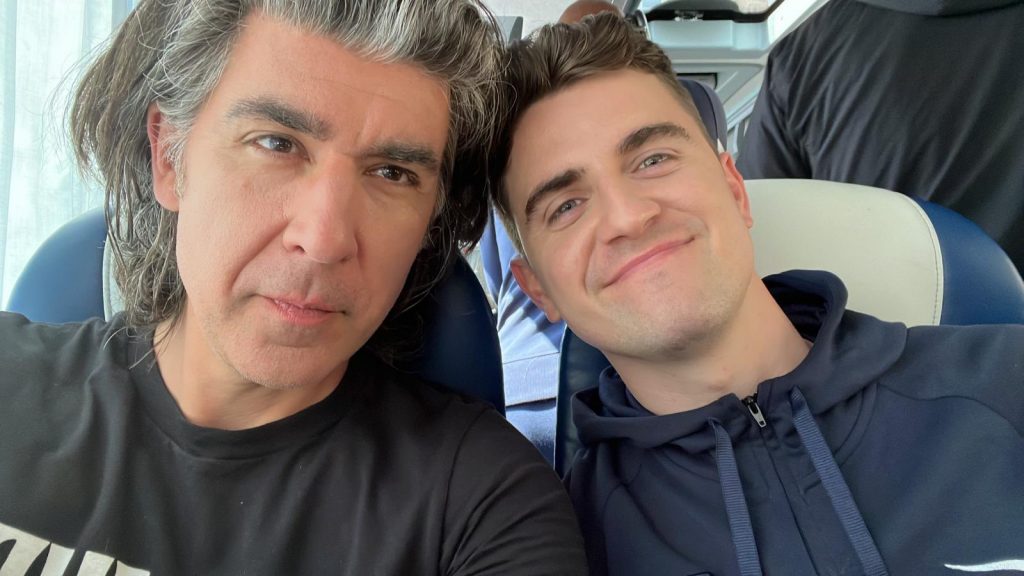Colin’s story in Ted Lasso suggests pathway to Pride for gay footballers
After three seasons, the AFC Richmond journey is over – and with it, the conclusion of Colin Hughes’ story; in the final series, viewers saw the Welsh footballer forge a bond of friendship with journalist Trent Crimm; in Pride Month, it’s the sort of positive LGBTQ+ representation we need in the game…

“An endless longing for friendship” – that’s the English translation of a line of poetry engraved at the Homomonument in Amsterdam.
The memorial is the location for a conversation between characters Trent Crimm and Colin Hughes in the TV show Ted Lasso.
Spoiler alert here for anyone reading who hasn’t yet seen ‘Sunflowers’ and thinks they might. This sixth episode of the final season is wonderfully written, and worth a watch just on its own.
After bumping into Trent (James Lance) at a gay bar, closeted Colin (Billy Harris) explains to the writer why coming out publicly doesn’t appeal to him – “I don’t want to be a spokesperson” – but admits that he does yearn for some of the freedoms that would come with it.
Colin dreams of celebrating a victory by kissing his boyfriend in the same way his team-mates get to kiss their girlfriends and wives after a win.
But before that, he wants to kiss goodbye to the misery of make-believe. He says:
“I have an ache… for both my lives to be my only life… I know we can’t fix every ache inside of us. But I shouldn’t have to pretend it’s not there either.”
Realism was never the aim with AFC Richmond – their Premier League title challenge is pure fantasy football – but this particular exchange feels so right.
It’s no surprise to hear Lance describe in interviews how thoroughly he researched and read up on the diverse experiences of gay men, to better understand Trent’s journey as a journalist who has accepted his sexuality in later life.
The actor cites Matthew Todd’s 2016 book Straight Jacket, which powerfully pulls apart the causes of gay shame, as an important influence.
In a chapter titled ‘Towards A New Way of Living’, Todd writes about how “the absolute number-one problem” that came up during his research was loneliness.
It’s why that verse at the Homomonument, taken from a work written a century ago by Jacob Israël de Haan, is so apposite. Coming out won’t guarantee true love but it’s highly likely to lead to honest friendships.
That was my discovery when I opened up a decade ago. Not only did I meet new people who I grew close to, I also strengthened the bonds I had with others. Over time, the ‘fake friends’ fell away.
Todd also calls for “a new community” of venues and spaces that will allow friendships to flourish between LGBTQ+ people and allies.
Seven years later, the effects of the pandemic and the closure of many gay bars have been barriers to progress but inclusive sports clubs and groups continue to proliferate, bringing people together.
He also makes other recommendations. One of them states: ‘The mainstream media need to give a better reflection of LGBT lives and issues’.
In an age of so much choice, Ted Lasso is about as mainstream as it now gets. In late April 2023, when the ‘Sunflowers’ episode was available to watch on Apple TV, the show hit record viewing figures, even if the Rotten Tomatoes ratings did dip when compared to the previous season.
But what I’ve come to appreciate the most was that this sizable audience wasn’t squandered.
Too often, the depiction of sportsmen struggling with their sexuality is sensationalised or given the soap-opera treatment, a small town drama sandwiched between so many others.
Colin’s conundrum gets more sensitive consideration. And here, it isn’t the reporter who is responsible for adding to the footballer’s anguish – instead, he’s the confidante who actually helps to alleviate it.
Changing the narrative
That wasn’t the outcome that was telegraphed to Ted Lasso fans at the end of episode three, when Trent spotted Colin stealing what he thought was a private kiss with his boyfriend Michael.
The lingering damage caused by sections of the media through their previous negative, intrusive coverage of sexuality leads to ongoing suspicion today. It turned out Trent wasn’t the villain – far from it.
Reporting standards have improved, but every few months the tabloids and their websites fan the flames of gossip about secret gay footballers – stoked further by social media – which carelessly turns the heat up on real-life players who can relate to Colin.
The toxic mix of speculation, scorn and insouciance sends its own message: keep sexuality and sport separate. It stops someone’s two lives becoming one.
The representation of gay journalists in the game suffers too. Todd adds in Straight Jacket: “In my experience, gay media staff are often too scared to push gay content for fear of being labelled ‘the gay staff member’, or they aren’t interested because of their own issues.”
It’s a vicious circle – but we’ve shown that it can be broken. Sports Media LGBT+ has been going for six years and we now have over 70 editors, journalists, reporters and comms officers in our core group.

Meanwhile, the LGBTQ+ Professionals in Football Collective has grown steadily in its first year and has attracted many gay and bi people, in a variety of roles.
The confidence each has gained from cultivating close friendships with others who are out in the game has been crucial to their individual development. The Collective offers a confidential space in which to make connections with one or more members.
With the domestic football season finishing before June, there’s limited Pride Month visibility in British sport, certainly when compared to the US.
Outside of activations at a couple of county cricket T20 matches, the LTA tennis tournaments, a few racecourses and the annual match staged by rugby league’s Keighley Cougars, it’s a low energy approach when you consider every MLB outfit bar one has a Pride Night this month that raises money for community good causes.
However, there was a celebratory moment at an English stadium the other week that will have lifted the hearts of many LGBTQ+ people who were watching – and it happened immediately after the Premier League title was decided.
“I’m so proud of you,” said Michael to his boyfriend as AFC Richmond players, staff and fans jumped for joy around them on the Nelson Road pitch.
The Greyhounds got their moment of glory – and Colin got his kiss.
I’m not pretending it’s as straightforward as that to put a halt to the heartache of living a double life.
But if that scene in Amsterdam between Trent and Colin helps to fuel another footballer’s ambition to be the very best version of himself, on and off the field, he’ll have two role models to thank.
UPDATE (26/6/23) – Jon joined a special Pride Month episode of the Footballco Business Podcast to discuss Colin’s storyline in Ted Lasso. You can watch on YouTube below, or listen here, and there’s an accompanying article on the Goal.com website too.
Sports Media LGBT+ is a network, advocacy, and consultancy group that is helping to build a community of LGBTQ+ people and allies in sport. We’re also a digital publisher and can help with your content requirements. Learn more about us here.
We’re interested in your news and stories. Share with us and tap into a worldwide audience through our Google News affiliate website which attracts thousands of visitors, and our popular social channels. Contact us to discuss how we can help you.


